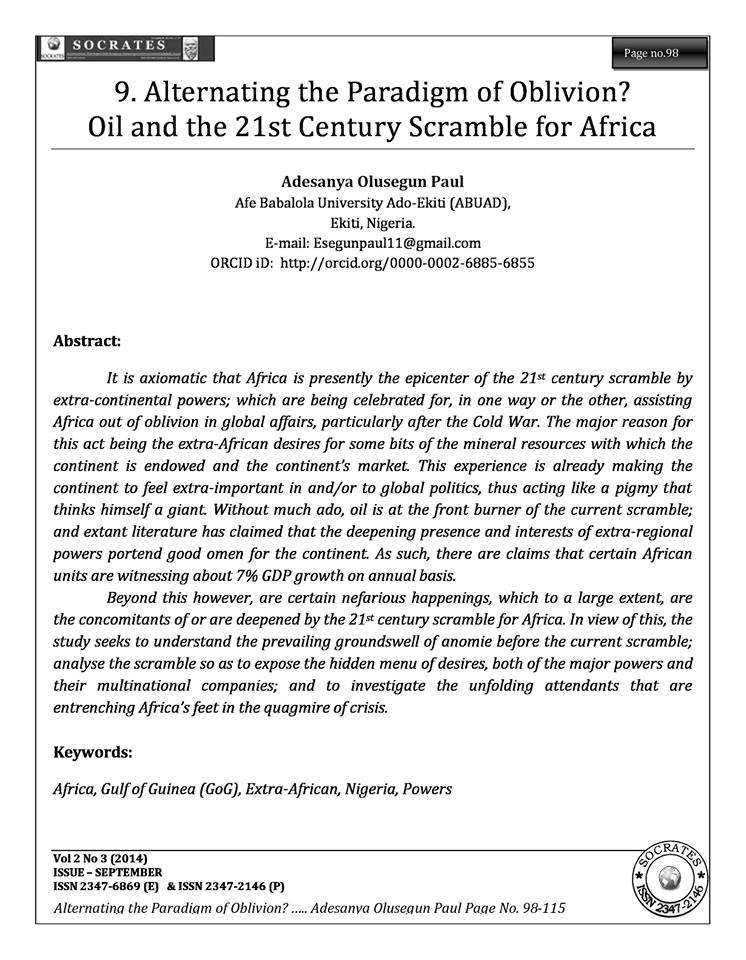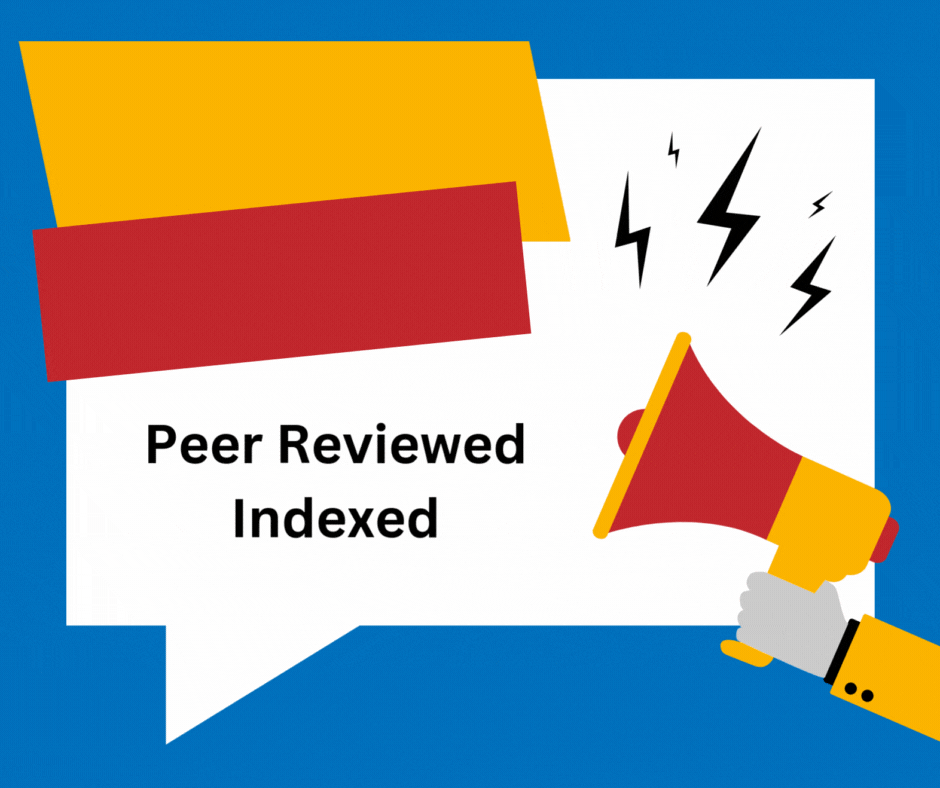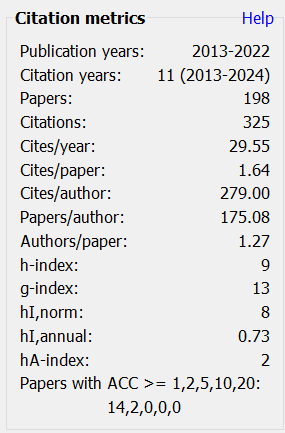Alternating the Paradigm of Oblivion? Oil and the 21st Century Scramble for Africa
Keywords:
Africa, Gulf of Guinea (GoG), Extra-African, Nigeria, PowersAbstract
It is axiomatic that Africa is presently the epicenter of the 21st century scramble by extra-continental powers; which are being celebrated for, in one way or the other, assisting Africa out of oblivion in global affairs, particularly after the Cold War. The major reason for this act being the extra-African desires for some bits of the mineral resources with which the continent is endowed and the continent’s market. This experience is already making the continent to feel extra-important in and/or to global politics, thus acting like a pigmy that thinks himself a giant. Without much ado, oil is at the front burner of the current scramble; and extant literature has claimed that the deepening presence and interests of extra-regional powers portend good omen for the continent. As such, there are claims that certain African units are witnessing about 7% GDP growth on annual basis. Beyond this however, are certain nefarious happenings, which to a large extent, are the concomitants of or are deepened by the 21st century scramble for Africa. In view of this, the study seeks to understand the prevailing groundswell of anomie before the current scramble; analyse the scramble so as to expose the hidden menu of desires, both of the major powers and their multinational companies; and to investigate the unfolding attendants that are entrenching Africa’s feet in the quagmire of crisis.
Downloads
Metrics
References
Kaberuka, D. (2013). This is Africa’s hour. Retrieved from http://www.afdb.org/en/blogs/afdb-president-this-is-africas-hour/about-us/
Southall, R. & Melber, H. (Eds.). (2009). A New Scramble for Africa? Imperialism, Investment and Development. Scottsvile, South Africa: University of KwaZulu-Natal Press.
Waltz, K. N. (1979). Theory of International Politics. Reading: Addison Wesley.
Kissinger, H. (1999). Years of Renewal. London: Simon & Schuster, Inc.
Magubane, B. M. (1999). The African Renaissance in Historical Perspective. In M. W.
Makgoba (Ed.), African Renaissance: The New Struggle. Cape Town: Mafube Publishing.
Fukuyama, F. (1999). ‘Second Thoughts’. The National Interest, 56, p.16-33.
Kaplan, Morton A. (2005). System and Process in International Politics. Colchester, UK: ECPR Press.
Rourke, J. T. (2008). International Politics on the World Stage. New York: McGraw Hill.
Wallerstein, I. (2004). World-Systems Analysis: An Introduction. Durham, N. C.: Duke University Press.
Cardoso, F. H. and Faletto, E. (1979). Dependency and Development in Latin America. Berkeley: University of California Press.
Cox, R. W. (2002). Political Economy of a Plural World. London: Routledge Thompson, W. R. (1983). Introduction: World System Analysis with and without the Hyphen. In Thompson, W. R. (ed.). Contending Approaches to World System Analysis. Thousand Oaks, Calif.: Sage.
Potekhin, I. (1962). Problems of Economic Independence of African Countries. Moscow:
Bauer, P. T. (1972). Dissent on Development. Cambridge, Massachusetts: Harvard University Press.
Klitgaard, R. (1991). Strategies for Reform. Journal of Democracy, 2(4).
United Nations Department of Technical Cooperation for Development, Corruption in Government. (1990). TCD/SEM. 90/2 INT-89-R56. New York.
See Africa Progress Panel. (2013). Equity in Extractives: Stewarding Africa’s natural resources for all. Africa Progress Report.
Omojola, B. (2013/2014, December/January). ‘Ruffled Feathers’. Africa Today, 26-27.
Gurr, T. (1969). Why Men Rebel. Princeton, NJ: Princeton University Press.
Fawole, W. A. (1994). The Military and the Future of Democracy in Africa. In O. Omoruyi, D. Berg-Schlosser, A. Sambo & A. Okwuosa (Eds.), Democratisation in Africa: African Perspectives Benin City: Hima & Hima Ltd.
Clarke, D. (2007). Empires of Oil: Corporate Oil in Barbarian Worlds. London: Profile Books Ltd; also see Southall, R. (2009). Scrambling for Africa? Continuities and Discontinuities with Formal Imperialism. In Southall, R. & Melber, H., op. cit.
Kabukuru, W. (2012, May). Oil strikes off prospecting stampede. African Business, 66-68.
Southall, op. cit.
Morgan, M. J. (2012, February). Africa now Mecca for mining investment. African Business.
Africa Progress Panel, (2013). African citizens being robbed of their natural resources’, Kofi Annan says, accessed at www.africaprogresspane.org
Melber, H. (2009). Global Trade Regimes and Multi-Polarity: The US and Chinese Scramble for African Resources and Markets. In Southall & Melber. A New Scramble for Africa?
Wang, J. (2007). What Drives China’s Growing Role in Africa? Washington: International Monetary Fund.
Abrahamsen, R. (2004). A Breeding Ground for Terrorists? Africa & Britain’s War on Terrorism. Review of African Political Economy, 31(102), 677-684.
Versi, A. (2012, June). Africa’s progress under threat. Africa Business, 18-26.
Madueke, D. A. (2013, August). Nigeria laments rising insecurity in Gulf of Guinea. Premium Times. Accessed at www.premiumtimesng.com/business/143757-nigeria-laments-risinginsecurity-in-gulf-of-guinea.html on 8/4/2014; 5pm.
Liptak, K. (2014, April). 5 takeaways from Obama’s trip to Asia. CNN. Accessed at http://edition.cnn.com/2014/04/29/politics/obama-asia-trip/index.html?hpt=hp_c1 on 29/04/201; 7:46 am.
Brodkin, J. (2014, March). Chinese Tech Company Still Trying to Track Down NSA Infiltration. Accessed at www.arstechnica.com/tech-policy/2014/03/Huawei-on-nsa-ifforeign- spies-attacked-a-us-firm-thered-be-outrage/ on 19/04/2014; 8:59 pm; Jacobs, A. (2014, March). After Reports on N.S.A., China Urges End to Spying. NY Times. Accessed at mobile.nytimes.com/2014/03/25/world/asia/after-reports-on-nsa-china-urges-halt-tocyberspying.html?referrer= on 19/04/2014; 9:08 pm.
McReynolds, J. (2014). Cyber Transparency for Thee, But Not For Me. China Brief, 14 (8). Accessed at www.jamestown.org/programs/chinabrief/sing/?tx_ttnews%5Btt_news%5D=42246 on 19/04/2014; 8:41 pm.
Awake! (2014, January).
Oyedele, D. (2014, January). Nigeria: EU - Anti-Gay Law Contradicts Fundamental Human Rights. ThisDay. Accessed at http://www.allafrica.com/stories/201401160317.html on 13 April, 2014; 8:38 pm.
OJEME, V. (2014, January). GAY LAW: We’re not imposing our culture on Nigeria, says EU. Vanguard. Accessed at http://www.vanguardngr.com/2014/01/gay-law-imposing culturenigeria-says-eu/#sthash.vLz5Tx16.dpuf on 13 April, 2014; 8: 27 pm
Campbell, C. J. (2005). Oil Crisis. England: Multi-Science Publishing Co. Ltd.
Deffeyes, K. S. (2001). Hubert’s Peak. USA: Princeton University Press.
Jackson, S. A. (2007). Energy Security and Global Markets. European Energy Forum.
Campbell, C. J. & Laherrere, J. H. (1998). The End of Cheap Oil. Scientific American.
US Department of Energy, (2013). US Ethanol Production and Renewable Fuel Standard RIN bank. US Energy Information Administration. Accessed at http://www.eia.gov/todayinenergy/detail.cfm?id=11551 on 28/04/2014; 2:45 pm.

Downloads
Published
How to Cite
Issue
Section
License
Revised Copyright/CC license that applies to all the articles published after 05-02-2017
Attribution-NonCommercial 4.0 International (CC BY-NC 4.0)

Copyright/CC license that applies to all the articles published before 05-02-2017
Attribution-Non Commercial-No Derivatives 4.0 International (CC BY-NC-ND 4.0)

Author(s) will retain all the right except commercial and re-publishing rights. In the case of re-publishing, they will have to obtain written permission from the journal. Additional licensing agreements (Creative Commons licenses) grants rights to readers to copy, distribute, display and perform the work as long as you give the original author(s) credit, they can not use the works for commercial purposes and are not allowed to alter, transform, or build upon the work. For any reuse or distribution, readers and users must make clear to others the license terms of this work. Any of these conditions can be waived if you get permission from the copyright holders. Nothing in this license impairs or restricts the authors’ rights. To view a copy of this license, visit http://creativecommons.org/licenses/by-nc-nd/4.0/ or send a letter to Creative Commons, 171 Second Street, Suite 300, San Francisco, California, 94105, USA.
Research Papers published in SOCRATES are licensed under an Attribution-NonCommercial-NoDerivatives 4.0 International (CC BY-NC-ND 4.0)












